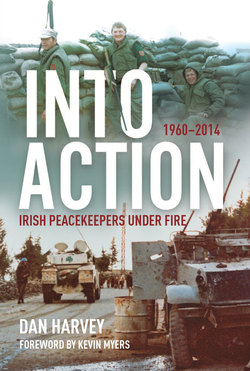Читать книгу Into Action - Dan Harvey - Страница 10
На сайте Литреса книга снята с продажи.
ОглавлениеINTRODUCTION
A New Departure
The Irish Defence Forces’ involvement in overseas peacekeeping service was to prove the single biggest development in their history. It was also to involve its members in a number of significant critical moments, when Irish soldiers as peacekeepers, inserted into volatile and violent, often difficult, dangerous and deteriorating situations, walked the very fine line between peacekeeping and war-fighting, the need to return fire and otherwise using measured force as a last resort in self-defence.
Peacekeepers are often asked to do what politics and diplomacy have not done. Partisan, belligerent protagonists have often been part of the reality faced by Irish peacekeepers in an array of highly varied and intricate mission areas. Irish Peacekeepers, using patience, persistence, impartiality and professionalism have addressed the effects of complicity, complexity, crisis and conflict. Despite some setbacks, problems and difficulties, peacekeeping works and the Irish are good at it. On occasion, the Irish Defence Forces, with nearly 60 years participation as peacekeepers, 85,000 individual tours of duty in over 70 United Nations (UN) or UN-approved missions, and 86 Defence Force members paying the ultimate price, have experienced circumstances when a demonstration of resolve became necessary. Ireland is one of the most consistent European contributors to the UN and is one of the most successful contributors to UN-mandated Peace Support Operations. They are well regarded by those with whom they operate and the various peoples of the mission areas in which they have found themselves. Today it is taken for granted that Irish soldiers should serve alongside those of other nations in UN peacekeeping missions worldwide, yet when first requested to do so it was an entirely ‘New Departure’ and Ireland moved into the mainstream of then current world events.
What is hardest won is most savoured, and often in the histories of different nations that is peace. That is why, when frequently coming from conflict, it is crucial that once gained peace is maintained. Peace facilitates stability, bringing normality into peoples’ everyday lives and generating good governance and economic development. Lose peace and hope and a peoples’ future will become severely jeopardised. That is why, coming from fragile political–military circumstances, a fledgling peace sometimes needs the presence of a peacekeeping force to maintain and nurture it. There are, however, certain critical variables that affect the always uncertain feasibility of a peacekeeping force achieving a successful outcome. Among the issues influencing the situation are, and remain to be, a clear and workable mandate; the nature of the conflict; consent of the parties involved; the physical environment; the extent of international support; and both the appropriate configuration and means available to the peacekeeping force.
The degree to which all or most of these determinants were present and played out had a significant bearing on what the peacekeeping force was able to achieve. The absence of any one, or more of these factors, adversely affected the context in which the peacekeeping force was able to perform. This had often and all too frequently been the case, resulting in the peacekeeping force of which the Irish were members being tasked to keep a peace where there was, in fact, no peace to be kept. Throughout the Irish Defence Forces’ rich experience of peacekeeping in many mission areas throughout the world, confrontation was sometimes part of this ‘strange soldiering’ involvement. Irish peacekeepers have been severely challenged, tested, and become embroiled in some noteworthy actions. Irish peacekeepers have seen action in the Congo (Niemba, Jadotville and ‘The Tunnel’ at Élisabethville); in Lebanon (At-Tiri); in Kosovo (the St Patrick’s Day Riots of 2004); in Chad; and more recently in Syria.
Interestingly, an analysis of these engagements illustrates the presence of some distinguishing commonalities, such as unexpected ‘mission command’; sub-unit involvement; leadership; the value of training; strategic implications of a tactical incident; and not to overstate it, bravery. These incidents were all the more remarkable because the Irish, adhering to peacekeepers’ strict rules of engagement, had to act against protagonists engaging without such rules.
‘Peacekeeping’ is not mentioned in the UN Charter, it evolved out of necessity. So what was a ‘New Departure’ for the United Nations also became one for the Irish, and for six decades this Irish participation has greatly contributed to peace throughout the world.
Departure for the Congo. Members of 33rd Irish Battalion boarding a United States Air Force C-124 Globemaster transport plane at Baldonnel Aerodrome, 18 August 1960.
Courtesy of the Military Archives, Dublin
